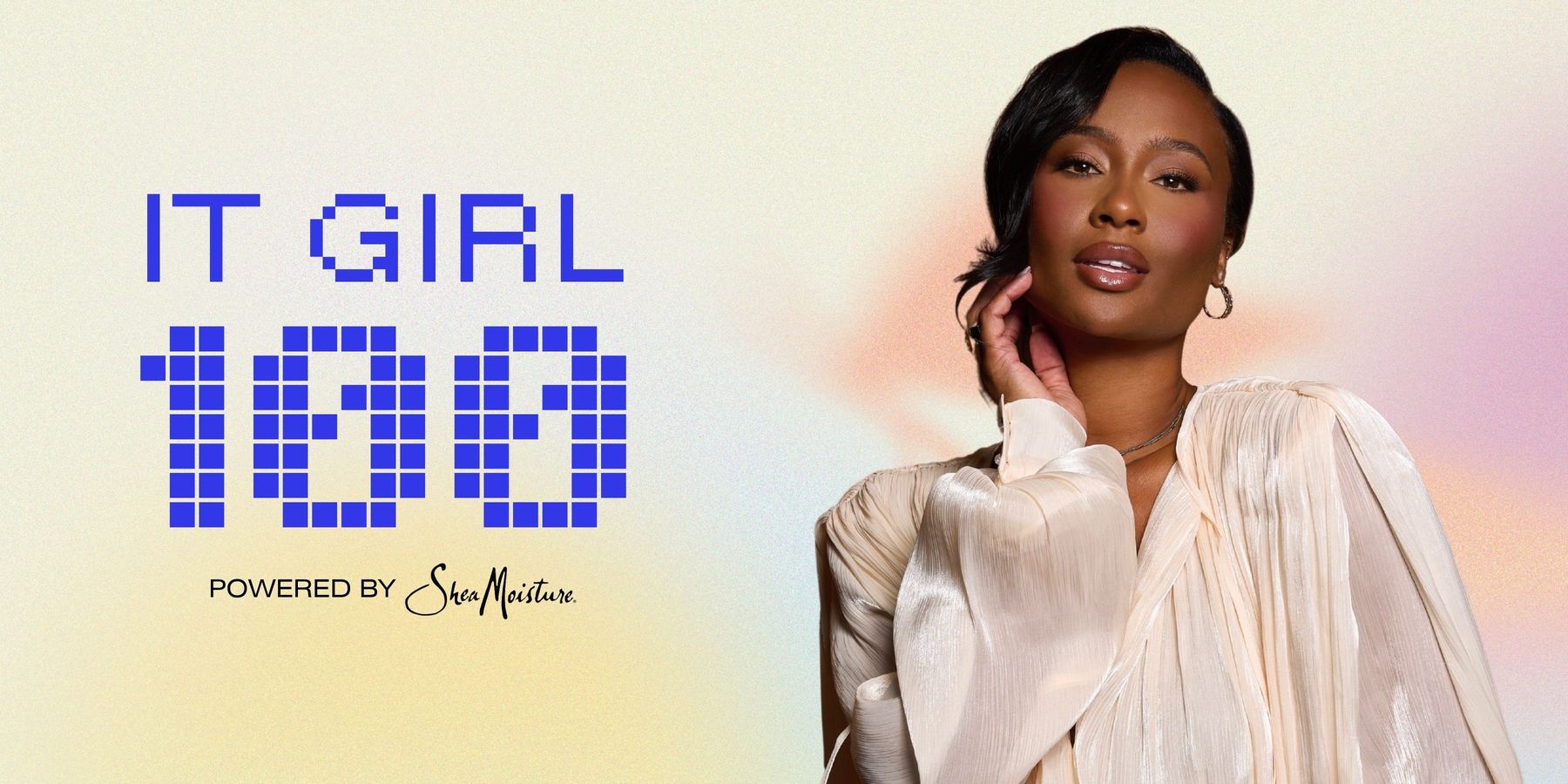These Influencers Are Challenging One Of The Largest Ambassador Marketing Companies To Show Receipts
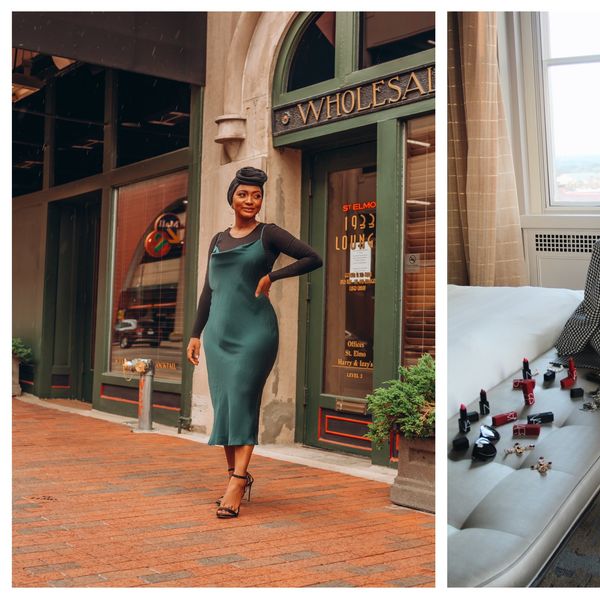
When I think of an influencer, I think of hard-working individuals who produces fresh content tailor-made for their following. Everyone is an influencer in their own right so there are different types of influencers — Mega, Macro, Micro, and Nano. Within these varying categories, there is a myriad of opportunities for influencers to partner with brands of all kinds. But, let's be honest, the influencer space is predominantly white. This means that influencers of color have to work twice as hard for the same opportunities as white influencers. Imagine being an influencer of color and learning that your work is valued less than that of your white counterparts. Story of a black creative's life, right?
The 2020 revolution is forcing the world to stop and listen to black folks. Thanks to a pandemic within a pandemic, society is finally hearing the cries of black people. Granted, we have been saying "per my last email" to injustice for decades but we will take what we can get at this point. Unfortunately, injustices happen to us in all spaces. For that reason, heavyweight influencers like Aicha Balde and Marche Robinson created the #OpenFohr campaign.
In case you don't know about Fohr, let me learn you something. Fohr is a global influencer marketing platform for ambassadors and brands. The goal of the platform is to provide influencers with tools that help them create a cutting edge marketing strategy, leading them to partnerships and campaigns. Fohr proudly states, "We support influencers. We are nothing without our influencer community, and we act accordingly." And like many other companies, Fohr jumped on the trend to pause advertisements and post anti-racism resources amidst the civil unrest that followed the murder of George Floyd. The gag is, they don't walk it like they talk it. For years, Black and Brown influencers have made it their business to share their grievances with being underpaid and there has not been any change.
That's where Aicha and Marche come in. We had the chance to dig deeper into this movement and what it means to these amazing women.
xoNecole: Tell us about yourself and how you became an influencer.
Aicha Balde: My name is Aissatou Balde but only my dad calls me Aissatou, everyone else knows me as Aicha. I am a West African-born full-time working mom and a Black content creator (@talesandturbans). My journey as a content creator started as an outlet to empower African [and] Muslim girls like me to do things that seemed impossible, such as juggling school, family, and work. Today, I pride myself in creating a space for open and difficult conversations about motherhood, identity, and life, along with the fun stuff like fashion, skincare, and food.
Marche Robinson: I'm Marche Robinson and I am an attorney and blogger (@marcherobinson) living in Raleigh, NC. I've been blogging since 2012. I graduated law school in 2010 and the market was very bad. There were not a lot of legal jobs. I took a contract role in Charlotte and at the time I had an inconsistent working schedule and needed something creative to fill the time. I started reading blogs and my friends and family told me I should start one. So, in August of 2012, I launched my blog and initially just shared fashion, beauty and décor images I found online.
Why did you start the OpenFohr movement?
Aicha & Marche: A group of eight Black content creators - Aissata Diallo, Denisse Myrick, Valerie Eguavoen, Yvette Corinne, Marche' Robinson, Nasteha Yusuf, and Nuni Yusuf, and I started #OpenFohr as a next step in a series of interventions against racism at Fohr. Over the past two years, we have complained, explained, consulted, and recommended solutions to Fohr, but our voices have been silenced with polished campaigns that convince the mainstream media that Fohr is a changemaker in the content creation space.
Agencies like Fohr have capitalized on the growing call for "diversity and inclusion" in the influencer industry without really making any changes to their exploitative and discriminatory practices. We created the OpenFohr campaign because we cannot allow people to keep exploiting the anti-racist narrative for profits. Over the past two weeks, as the Black Lives Matter movement took center stage in the public discourse, Fohr paused its advertising, posted protest resources, and even provided anti-racism resources on Instagram. Yet, many of the Black content creators who have worked with them are discriminated against and underpaid.
We also want people to know that this is about both racism and economic exploitation. Fohr boasts over 100,000 (majority-white) influencers on their online platform, yet only 4% (just over 4,000) content creators have ever had a contract with Fohr. They have created a platform that does not value influencers as people but sees them as a commodity to be sold to brands. It is impossible to address the issues we see at Fohr without addressing the culture of consumerism and exploitation perpetrated by the industry.
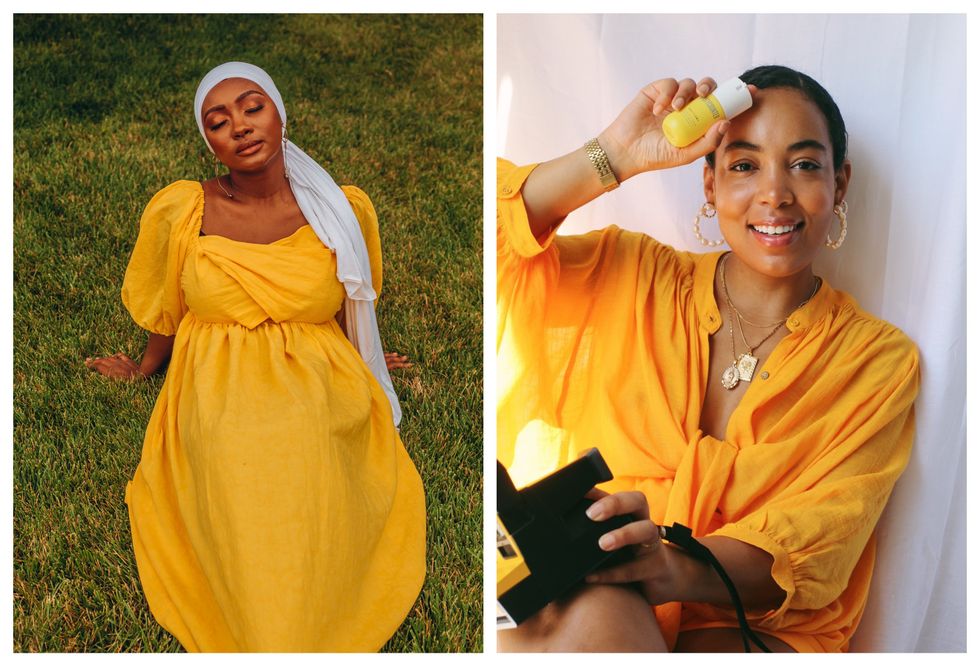
Left to Right: Aicha Balde, Marche Robinson
Photos Courtesy of Aicha Balde & Marche Robinson
"We want people to know that this is about both racism and economic exploitation. Fohr boasts over 100,000 (majority-white) influencers on their online platform, yet only 4% (just over 4,000) content creators have ever had a contract with Fohr. They have created a platform that does not value influencers as people but sees them as a commodity to be sold to brands. It is impossible to address the issues we see at Fohr without addressing the culture of consumerism and exploitation perpetrated by the industry."
What does it mean to be a Black influencer?
Aicha: To be a Black influencer means showing up in spaces where you may not be wanted and still doing it for girls who look like you. I learned the hard way that brands tend to gravitate more towards bloggers that fit the standard of beauty. For a long time, I thought, "Blogging isn't for me because I don't look 'the part'." Even photographers have blatantly told me that they don't know how to edit my skin tone, completely unwilling to learn and unable to even recommend an alternative contact. The biggest challenge of being so diverse in this business is finding people who can understand you and won't crush your confidence. I blog to remind myself and others that we are good enough; our diversity is an asset, not a drawback.
Marche: When I first started out, being a Black influencer meant filling a void. Fashion magazines and sites rarely shared Black women. They still have a very long way to go so I still feel this way. I feel like influencing is a way to share fashion, beauty, etc with women who can relate to me. It's not easy for Black women to open a magazine and see a woman like them sharing their story or their favorite products. If it were not for Black influencers, there would not be as much representation.
When you learned of the influencer pay gap, how did you feel?
Aicha: These issues are not new. Black bloggers have been discussing our unfair treatment in the Influential Marketing world for years, but to no avail. What finally broke the camel's back was the fact that Fohr had the audacity to use the #BlackLivesMatter issue to their advantage despite their repertoire of exploiting us. When I say us, I don't just mean Black content creators. This includes their Black employees who cannot speak out about their treatment for fear of being ostracized.
Marche: Honestly, I was not surprised. Pay gaps are present in every industry unfortunately. I've been in the position where I was drastically underpaid than my legal colleagues in certain jobs even though I had the same or more experience. It's unfortunate because I think that we've become accustomed to being undervalued. I also feel like there is this veil of secrecy that prevents you from discussing your pay, so you can sometimes feel like you have negotiated the best rate when you didn't.
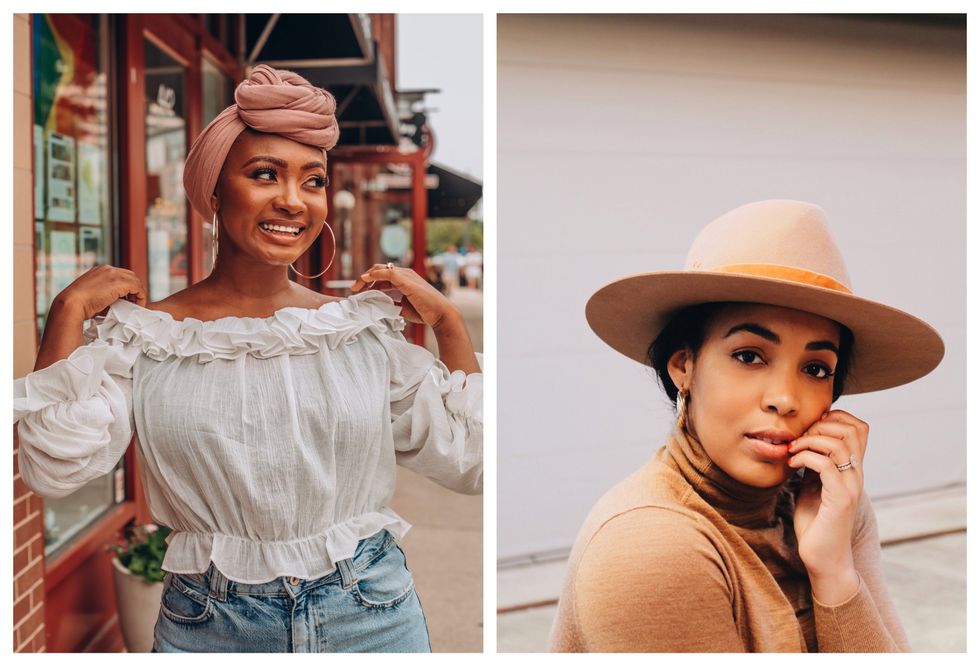
Left to Right: Aicha Balde, Marche Robinson
Photos Courtesy of Aicha Balde & Marche Robinson
"Pay gaps are present in every industry unfortunately. I've been in the position where I was drastically underpaid than my legal colleagues in certain jobs even though I had the same or more experience. It's unfortunate because I think that we've become accustomed to being undervalued. I also feel like there is this veil of secrecy that prevents you from discussing your pay, so you can sometimes feel like you have negotiated the best rate when you didn't."
What are your demands of Fohr?
Aicha & Marche: Fohr must stop treating this movement as a PR nightmare to hide from and instead, face it as the call to accountability of their actions and inactions over the years. You cannot have an entitled and unaware homogenous-white staff leading an organization and expect to get it right. You will always miss the mark because there's no one to say otherwise. Lack of diversity is how you end up taking advantage of Black creators and complain when you get called out. Fohr needs an independent outside party to look at their structure and provide constructive criticism. Most importantly, Fohr needs an HR department. You cannot fairly police yourself. We know that, so let's change that.
Why do you think it's important for Fohr to show their authentic commitment to Black influencers?
Aicha: I personally don't think Fohr is capable of being authentic to their Black influencers. This was never something that was on their agenda. As I said, this conversation has been going on for over two years but nothing has changed. The creation of The Fohr Freshman Class was a result of Fohr getting called out for lack of diversity, and yet they still failed us. It is essential for authentic commitments to happen because Black content creators are as deserving of our space in this sphere as much as anyone else. We are here and we matter.
Marche: Fohr should show authentic commitment because they have consistently held themselves out to be supportive of diversity and leader in the influencer marketing industry. How can you hold yourself out to be so groundbreaking when you lack diversity within your organizing and with the bloggers you hire for campaigns? I think there is this tendency for people to say, "Oh that's just the industry," but that doesn't make it right. People should be paid adequately for the service they provide.
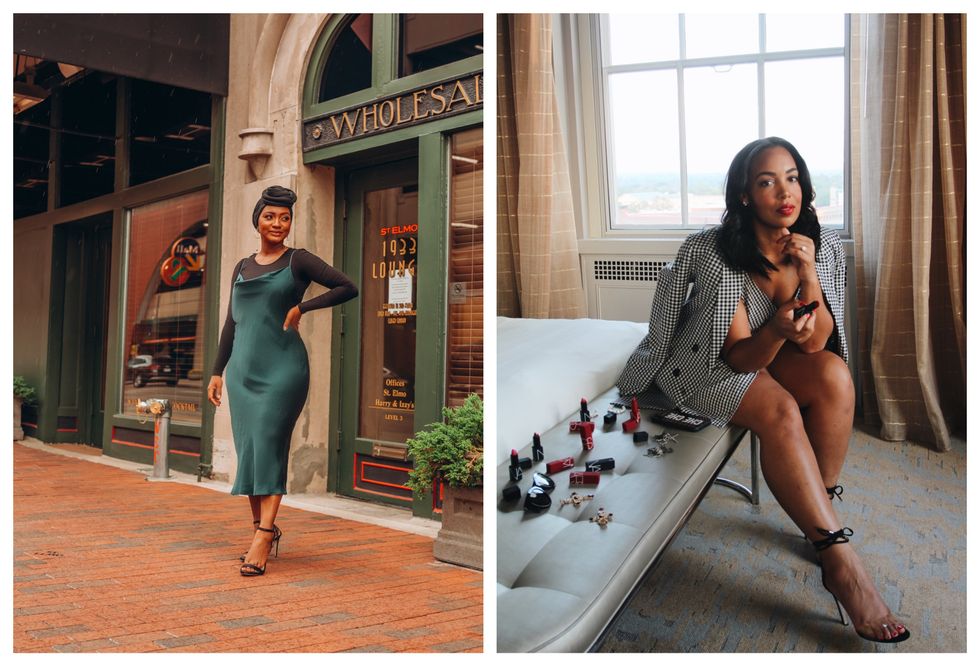
Left to Right: Aicha Balde, Marche Robinson
Photos Courtesy of Aicha Balde & Marche Robinson
"It is essential for authentic commitments to happen because Black content creators are as deserving of our space in this sphere as much as anyone else. We are here and we matter."
What advice do you have for other influencers struggling to create?
Aicha: Do things that come naturally to you and that revolve around your day-to-day life. Reach out to another sister to have a creativity party and get ideas flowing. Most of my Insta family will tell you that my DMs are always open, whether it's for help, a listening ear, or to celebrate each other: I'm here for you, sis.
Marche: So many influencers have had to pivot during quarantine and now with the current movements. I think that you have to share what you are passionate about. When you do what you love it comes naturally. I actually started a TikTok account and it's been fun to create content in a new way and it has resonated a lot with my social media followers. I think this is a great time to step back and think of a new way to create and share what you love.
To keep up with the #OpenFohr movement, follow them on Instagram @openfohr. And follow Marche and Aicha on Instagram @talesandturbans and @marcherobinson.
Feature Image Courtesy of Aicha Balde & Marche Robinson
Exclusive: Viral It Girl Kayla Nicole Is Reclaiming The Mic—And The Narrative
It’s nice to have a podcast when you’re constantly trending online. One week after setting timelines ablaze on Halloween, Kayla Nicole released an episode of her Dear Media pop culture podcast, The Pre-Game, where she took listeners behind the scenes of her viral costume.
The 34-year-old had been torn between dressing up as Beyoncé or Toni Braxton, she says in the episode. She couldn’t decide which version of Bey she’d be, though. Two days before the holiday, she locked in her choice, filming a short recreation of Braxton’s “He Wasn’t Man Enough for Me” music video that has since garnered nearly 6.5M views on TikTok.
Kayla Nicole says she wore a dress that was once worn by Braxton herself for the Halloween costume. “It’s not a secret Toni is more on the petite side. I’m obsessed with all 5’2” of her,” she tells xoNecole via email. “But I’m 5’10'' and not missing any meals, honey, so to my surprise, when I got the dress and it actually fit, I knew it was destiny.”
The episode was the perfect way for the multihyphenate to take control of her own narrative. By addressing the viral moment on her own platform, she was able to stir the conversation and keep the focus on her adoration for Braxton, an artist she says she grew up listening to and who still makes her most-played playlist every year. Elsewhere, she likely would’ve received questions about whether or not the costume was a subliminal aimed at her ex-boyfriend and his pop star fiancée. “I think that people will try to project their own narratives, right?” she said, hinting at this in the episode. “But, for me personally – I think it’s very important to say this in this moment – I’m not in the business of tearing other women down. I’m in the business of celebrating them.”
Kayla Nicole is among xoNecole’s It Girl 100 Class of 2025, powered by SheaMoisture, recognized in the Viral Voices category for her work in media and the trends she sets on our timelines, all while prioritizing her own mental and physical health. As she puts it: “Yes, I’m curating conversations on my podcast The Pre-Game, and cultivating community with my wellness brand Tribe Therepē.”
Despite being the frequent topic of conversation online, Kayla Nicole says she’s learning to take advantage of her growing social media platform without becoming consumed by it. “I refuse to let the internet consume me. It’s supposed to be a resource and tool for connection, so if it becomes anything beyond that I will log out,” she says.
On The Pre-Game, which launched earlier this year, she has positioned herself as listeners “homegirl.” “There’s definitely a delicate dance between being genuine and oversharing, and I’ve had to learn that the hard way. Now I share from a place of reflection, not reaction,” she says. “If it can help someone feel seen or less alone, I’ll talk about it within reason. But I’ve certainly learned to protect parts of my life that I cherish most. I share what serves connection but doesn’t cost me peace.
"I refuse to let the internet consume me. It’s supposed to be a resource and tool for connection, so if it becomes anything beyond that I will log out."

Credit: Malcolm Roberson
Throughout each episode, she sips a cocktail and addresses trending topics (even when they involve herself). It’s a platform the Pepperdine University alumnus has been preparing to have since she graduated with a degree in broadcast journalism, with a concentration in political science.
“I just knew I was going to end up on a local news network at the head anchor table, breaking high speed chases, and tossing it to the weather girl,” she says. Instead, she ended up working as an assistant at TMZ before covering sports as a freelance reporter. (She’s said she didn’t work for ESPN, despite previous reports saying otherwise.) The Pre-Game combines her love for pop culture and sports in a way that once felt inaccessible to her in traditional media.
She’s not just a podcaster, though. When she’s not behind the mic, taking acting classes or making her New York Fashion Week debut, Kayla Nicole is also busy elevating her wellness brand Tribe Therepē, where she shares her workouts and the workout equipment that helps her look chic while staying fit. She says the brand will add apparel to its line up in early 2026.
“Tribe Therepē has evolved into exactly what I have always envisioned. A community of women who care about being fit not just for the aesthetic, but for their mental and emotional well-being too. It’s grounded. It’s feminine. It’s strong,” she says. “And honestly, it's a reflection of where I am in my life right now. I feel so damn good - mentally, emotionally, and physically. And I am grateful to be in a space where I can pour that love and light back into the community that continues to pour into me.”
Tap into the full It Girl 100 Class of 2025 and meet all the women changing game this year and beyond. See the full list here.
Featured image by Malcolm Roberson
If there is one thing that I am going to do, it’s buy myself some scented soy candles. And, as I was looking at a display of them in a TJ Maxx store a couple of weekends ago, I found myself wondering just who decided which scents were considered to be “holiday” ones. The origin stories are actually pretty layered, so, for now, I’ll just share a few of ‘em.
I’m sure it’s pretty obvious that pine comes from the smell of fresh Christmas trees; however, scents like cloves, oranges, and cinnamon are attributed to two things: being natural ways to get well during the cold and flu season, and also being flavors that are used in many traditional holiday meals.
Meanwhile, frankincense and myrrh originate from the Middle East and Africa (you know, like the Bible does — some folks need to be reminded of that—eh hem — Trumpers) and ginger? It too helps with indigestion (which can definitely creep up at Thanksgiving and Christmas dinner tables); plus, it’s a key ingredient for ginger snaps and gingerbread houses. So, as you can see, holiday-themed scents have a rhyme and reason to them.
Tying this all in together — several years ago, I penned an article for the platform entitled, “Are You Ready To Have Some Very Merry ‘Christmas Sex’?” Well, in the spirit of revisiting some of that content, with a bit of a twist, I decided to broach some traditional holiday scents from the perspective of which ones will do your libido a ton of good from now through New Year’s Eve (check out “Make This Your Best NYE. For Sex. EVER.”).
Are you ready to check some of them out, so that, whether it’s via a candle, a diffuser, some essential oil, or some DIY body cream (check out “How To Incorporate All Five Senses To Have The Best Sex Ever”), you can bring some extra festive ambiance into your own boudoir? Excellent.
1. Vanilla
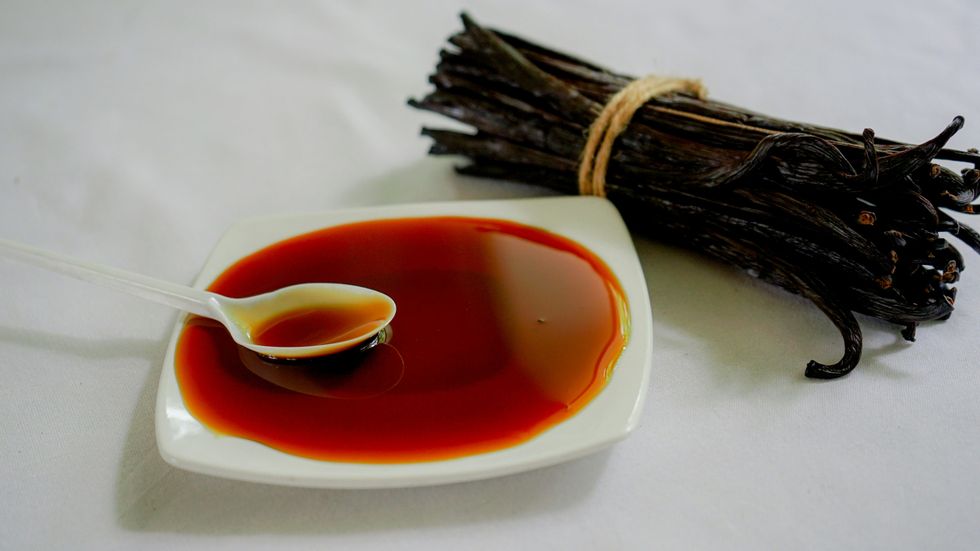
Unsplash
When it comes to holiday desserts, you’re going to be hard-pressed to find recipes that don’t include vanilla — and that alone explains why it is considered to be a traditional holiday scent. As far as your libido goes, vanilla is absolutely considered to be an aphrodisiac — partly because its sweet scent is considered to be very sensual. Some studies even reveal that vanillin (the active ingredient in vanilla) is able to increase sexual arousal and improve erectile dysfunction in men. So, if you adore the smell, here is more incentive to use it.
2. Frankincense

Unsplash
Although, typically, when people think about frankincense (and myrrh), it’s in the context of the gifts that the wise men brought Christ after he was born; it’s a part of the biblical Christmas story. However, frankincense goes much deeper than that. Sexually, since it has an earthy and spicy scent, some people like to use it to meditate (check out “What Exactly Is 'Orgasmic Meditation'?”). Also, since it has the ability to put you in a better mood, soothe and soften your skin and maintain your oral health — with the help of frankincense, every touch and kiss can be that much…sexier.
3. Cinnamon
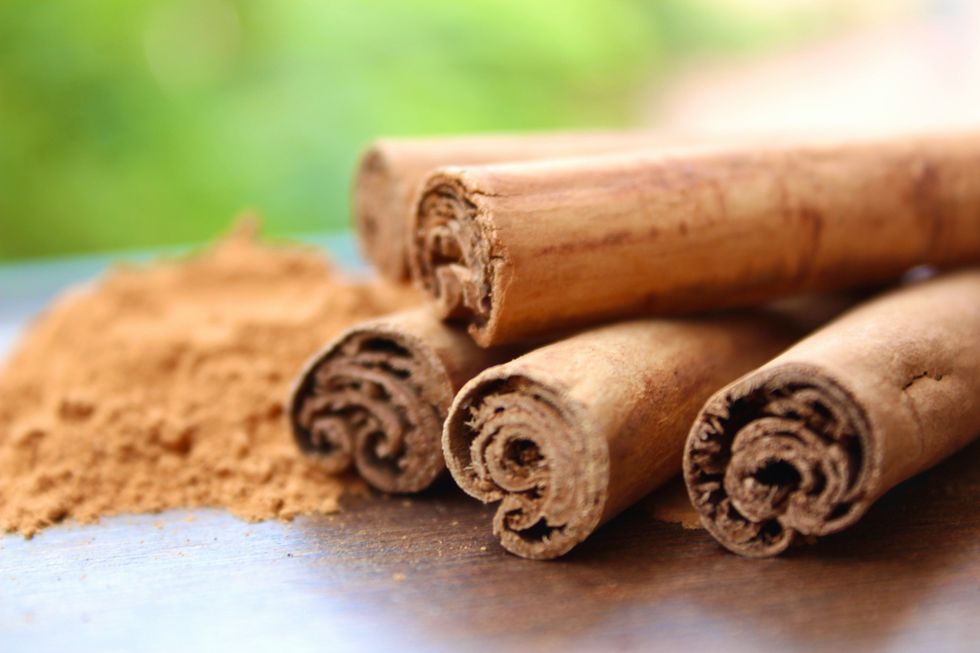
Unsplash
I already gave cinnamon a shout-out in the intro. Personally, I’ve been a fan of it, in the sex department, for a long time now (check out “12 ‘Sex Condiments’ That Can Make Coitus Even More...Delicious”). When it’s in oil form, it can be very sweet to the taste while sending a warm sensation throughout the body — which is why the giver and receiver of oral sex can benefit from its usage. Beyond that, cinnamon helps to increase blood flow to your genital region, elevate sexual desire and, some studies say that it can even help improve fertility. Beautiful.
4. Peppermint
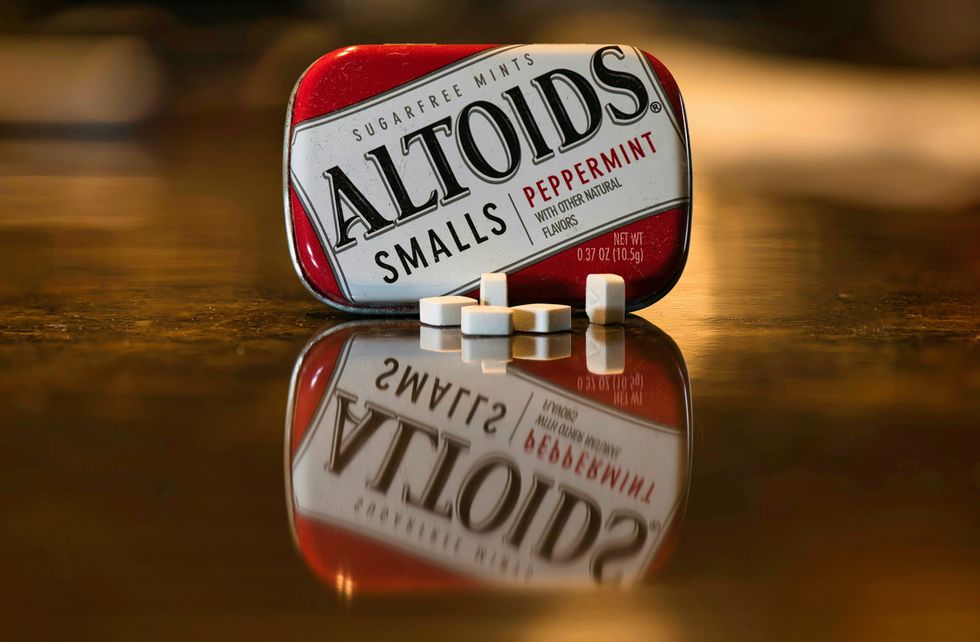
Unsplash
If there’s a signature candy for the holiday season, it’s probably a candy cane — which automatically puts peppermint in the running for being an official holiday scent. Pretty much, in any form, it’s got your sex life’s back because it’s hailed as being a sexual stimulant; in part, because its smell is so invigorating. Plus, it helps to (eh hem) ease headaches, it gives you more energy and it can definitely help to freshen your breath. Also, that minty sensation? The same thing that I said about cinnamon can apply to peppermint too (if you catch my drift).
5. Ginger

Unsplash
Whether it’s in a meal or in your bedroom, ginger is going to produce results that are hella spicy. On the sex tip, science has praised ginger for being able to increase sexual arousal, improve blood circulation (which intensifies orgasms) and strengthen fertility for many years. Scent-wise, I find it to be one that both men and women enjoy because it is both woodsy and sweet. So, if you’ve got some massage oil in mind, adding some ginger is a way to please you both.
6. Pomegranate
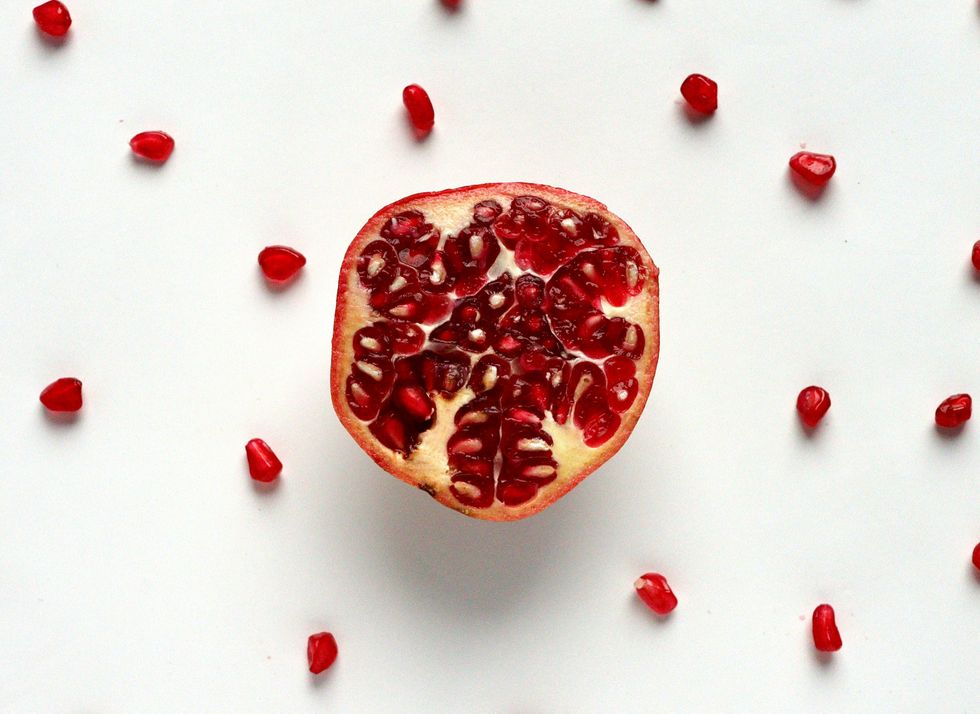
Unsplash
September through December is the time of year when pomegranates are considered to be in season. And, as someone who is a Rosh Hashanah observer, I have a personal adoration for them because I am aware of the various things that they symbolize in Hebrew culture including the fact that they are a fruit that represents love and fertility. So yeah, they would absolutely be an aphrodisiac — one that is perfect for this time of the year. While consuming it helps to boost testosterone levels in both men and women, the floral bittersweet smell that it produces can help to reduce stress while promoting relaxation (like most floral scents do) — and the more relaxed you are, the easier it is to climax.
7. Nutmeg
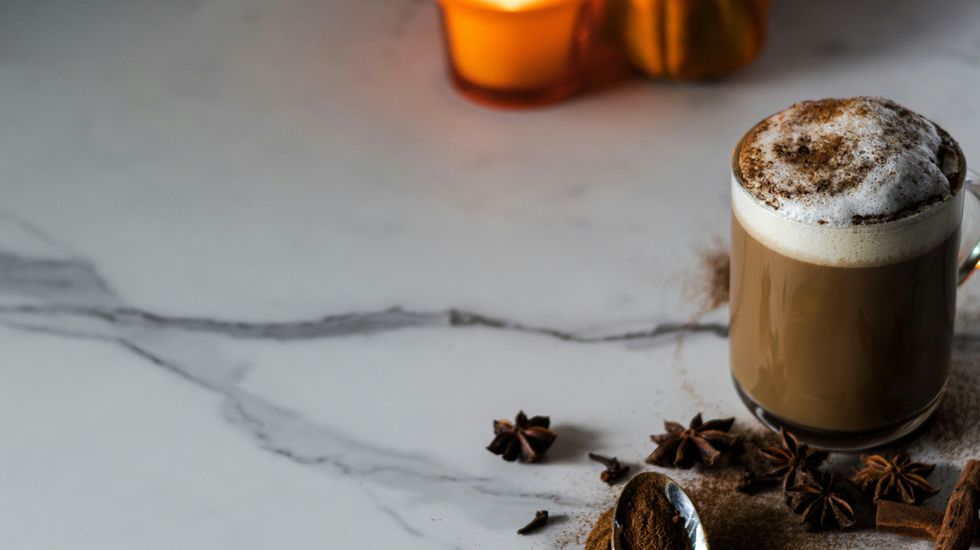
Unsplash
Another signature seasoning during the holiday season is nutmeg. It’s perfect in Thanksgiving sweet potato (or pumpkin) pie and Christmas morning French toast. And yes, it can also make your sex life better. If you consume it, it can intensify your libido and, overall, its warm-meets-spicy-meets-sweet smell is so inviting that it is considered to be a pretty seductive scent.
8. Cloves
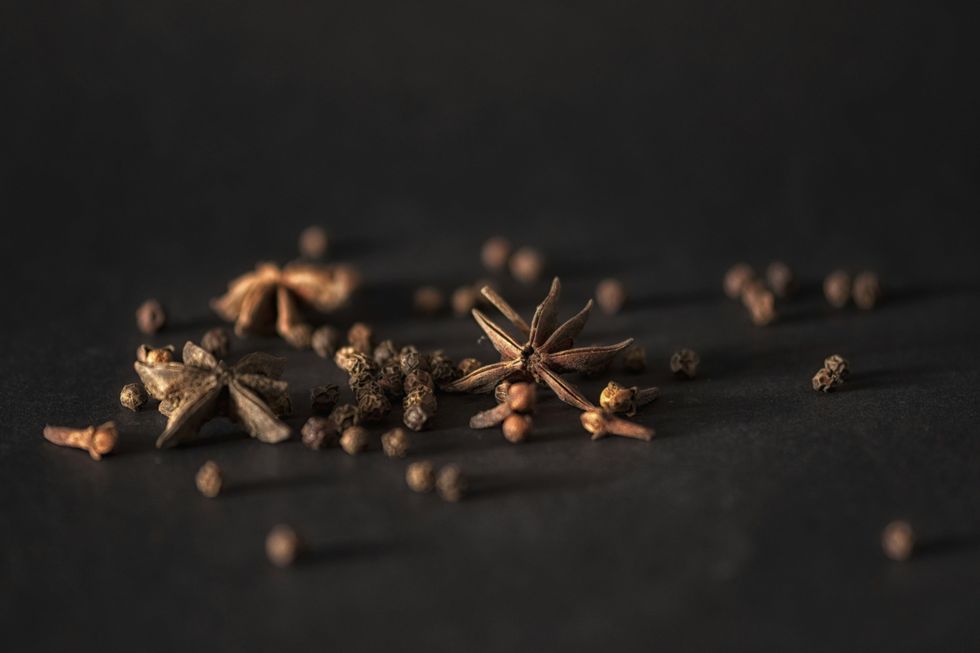
Unsplash
I ain’t got not one lie to tell you — if you’ve got a toothache, put some clove oil on that bad boy and send me a Christmas present for putting you on game. Aside from that, as I round all of this out, cloves are another holiday scent that can do wonders for your sex life. For men, it has the ability to significantly increase sexual arousal and improve stamina and endurance. For men and women alike, it also has a reputation for strengthening sexual desire. And for women solely? Well, if you want an all-natural way to increase natural lubrication down below — the scent and and feel (in DILUTED oil form) can make that happen. It can make the holidays especially special…if you know what I mean.
Ah yes — the atmosphere of the holidays and what it can do.
Take it all in! Scent ‘n whatever stimulating that comes with it! #wink
Let’s make things inbox official! Sign up for the xoNecole newsletter for love, wellness, career, and exclusive content delivered straight to your inbox.
Featured image by Giphy








